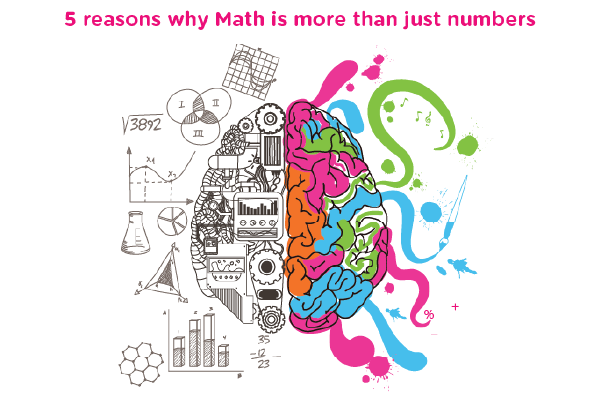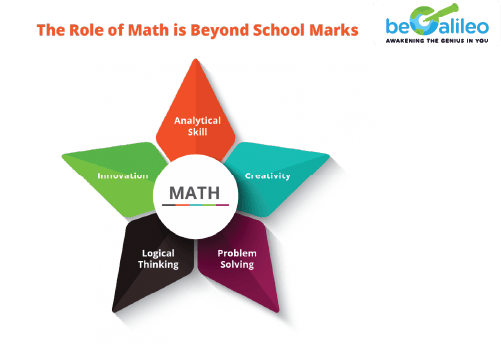In our daily lives, mathematics silently and powerfully influences countless aspects of our experiences, from mundane tasks to complex decision-making processes. Despite occasional grumbles about its challenges, understanding the importance of math is crucial in realizing its practical applications and the impact it has on our real-world encounters. In this blog, we will explore five compelling reasons why mathematics holds tremendous significance in our everyday lives. Prepare to uncover how math empowers us to make informed choices, solve problems, and navigate the intricacies of our modern world with confidence and precision. Let’s delve into the remarkable reasons why math is indispensable in our daily existence.

#1 – Math Develops Logical and Analytical Thinking Skills
Mathematics involves a lot of logical and analytical thinking, which is why it is used in many fields such as science, engineering, finance, and technology. When solving mathematical problems, individuals must think critically and logically to arrive at the correct answer. These skills are essential in everyday life, including decision-making, problem-solving, and reasoning.
Unlock Your Child's Math Potential with beGalileo!

🚀 Transform their math skills with personalized, 1-on-1 classes.
🧮 Experience integrated math and coding for real-world application.
👦 See your child excel—start with a Free Trial Math Class today!
#2 – Enhances Problem Solving Skills
Mathematics is an essential tool for solving complex problems. It teaches us to break down problems into smaller, more manageable parts and use critical thinking skills to develop solutions. This ability to break down complex problems into smaller parts can be applied in many other areas of life, from business and finance to personal relationships.
#3 – Teaches Attention to Detail
Mathematics requires attention to detail, as even a minor mistake can lead to incorrect answers. This is especially true for complex problems that require multiple steps to solve. The ability to pay attention to detail is crucial in many other areas of life, including academic work, scientific research, and professional fields such as medicine, law, and accounting.
#4 – Fosters Creativity and Innovation
Mathematics is an essential tool for fostering creativity and innovation. In mathematics, there is often more than one way to solve a problem. This means that individuals must think critically and creatively to determine the best solution. The process of problem-solving can inspire people to think outside the box and come up with unique ideas. Mathematics can also lead to the development of new theories and discoveries, leading to technological advancements and scientific breakthroughs. Additionally, mathematics is used in fields such as art and music, where it can be used to create intricate designs and rhythms. Therefore, it is clear that mathematics plays a vital role in nurturing creativity and imagination in individuals.
#5 – Sparks curiosity
Math is full of fascinating concepts that can pique students’ curiosity and inspire them to explore more. For example, students may wonder how the Fibonacci sequence appears in nature, or why prime numbers seem to behave in such unpredictable ways. Such questions can lead to further exploration, research, and discovery.

Multiple Research studies have shown these crucial benefits that mathematics education brings in.. Here are some key findings in these areas:
- A study published in the Journal of Problem Solving found that students who received problem-solving instruction in mathematics demonstrated improved problem-solving abilities compared to those who did not receive such instruction.
- According to research published in the Journal of Educational Psychology, mathematical problem-solving tasks require students to analyze, evaluate options, and develop strategies, which enhances their critical thinking and problem-solving skills.
- The National Council of Teachers of Mathematics (NCTM) emphasizes that math education fosters the development of problem-solving skills by encouraging students to apply mathematical concepts to real-world situations and tackle complex problems.
- A study published in the Journal of Experimental Child Psychology revealed that engaging in challenging mathematical tasks promotes perseverance and a growth mindset among students. They learn to embrace challenges, persist through difficulties, and develop a belief in their ability to overcome obstacles. Mathematics often involves multiple steps and requires persistence to reach a solution. The process of working through math problems teaches students the value of perseverance, as they learn to approach challenges with resilience and determination.
- Research published in the journal Science indicated that learning mathematics helps develop logical reasoning skills. The study found that individuals with a strong foundation in math tend to exhibit higher levels of logical thinking and problem-solving abilities. The logical structure and deductive reasoning inherent in mathematics cultivate students’ ability to analyze patterns, make connections, and draw logical conclusions. This skill set extends beyond math and can be applied to various areas of life.
- Contrary to the perception that math is solely a rigid and analytical subject, research published in the Journal of Mathematics Education explores the creative aspects of mathematics. It argues that mathematical creativity involves the ability to think flexibly, make connections, and generate novel solutions.
- A study published in the Creativity Research Journal found that mathematical problem-solving tasks can foster creative thinking skills, as students engage in divergent thinking to explore various approaches and solutions.
- According to a report by the National Endowment for the Arts , mathematical thinking often requires creative problem-solving strategies, imaginative reasoning, and the ability to view problems from different perspectives.
- Mathematics has the potential to spark curiosity and fascination. A study published in the Journal of Educational Psychology found that when students were provided with intriguing mathematical problems that piqued their curiosity, they exhibited higher levels of engagement and motivation in the subject.
These research findings indicate that mathematics has the capacity to nurture creativity and spark curiosity. The process of exploring mathematical concepts and solving problems can create a sense of wonder and curiosity as students delve into patterns, make connections, and uncover the underlying principles of mathematics. By presenting students with engaging mathematical problems, encouraging open-ended exploration, and fostering a sense of wonder, educators can inspire students to approach math with curiosity, imagination, and creative thinking. This not only enhances their mathematical abilities but also cultivates a broader sense of creativity and a lifelong curiosity for learning.
